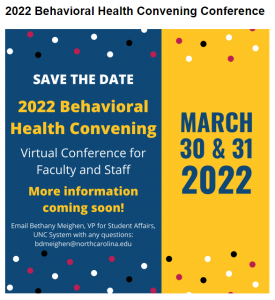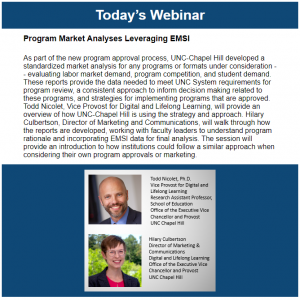February 25, 2022 DLI Webinar Announcement!

Fourth Friday of every month at 11 a.m. – 12 p.m. To join the webinar on the scheduled date and time:
|

Fourth Friday of every month at 11 a.m. – 12 p.m. To join the webinar on the scheduled date and time:
|



The Digital Learning Symposium is postponed due to the uncertainty of large indoor events given the continuing pandemic. We look forward to rescheduling this in person event and seeing you in the not-too-distant future.
Digital Learning Symposium – UNC System (northcarolina.edu)
For registration refunds, please contact Angie Callesis at epcallesis@northcarolina.edu. Please include your name, institution, and email address.

From the Digital Learning team at the UNC System Office!
| Program Market Analyses Leveraging EMSI
As part of the new program approval process, UNC-Chapel Hill developed a standardized market analysis for any programs or formats under consideration — evaluating labor market demand, program competition, and student demand. These reports provide the data needed to meet UNC System requirements for program review, a consistent approach to inform decision making related to these programs, and strategies for implementing programs that are approved. Todd Nicolet, Vice Provost for Digital and Lifelong Learning, will provide an overview of how UNC-Chapel Hill is using the strategy and approach. Jack Rodenfels, Assistant Director for Marketing and Program Development, will walk through how the reports are developed, working with faculty leaders to understand program rationale and incorporating EMSI data for final analysis. The session will provide an introduction to how institutions could follow a similar approach when considering their own program approvals or marketing.
|
| Realizeit Research Opportunity – In collaboration with Cornell University and the University of Pennsylvania (UPenn)
Call to Participate in “Intervention and Affect (Emotion)” research in collaboration with Cornell University and the University of Pennsylvania (UPenn). The goalof this research project is to learn effective and reliable methods to improve student success and reduce achievement gaps. Working with Cornell and UPenn, Realizeit will connect your course with psychologists and learning scientists at Stanford, CMU, University of Texas at Austin, National University of Singapore, University of Vienna, and Ateneo de Manila University. These researchers are developing practical solutions to improve student outcomes by embedding evidence-based strategies directly into course materials. Participation will require minimal effort from you and your course team. Still, Realizeit would greatly appreciate your input and feedback to ensure the intervention aligns with your course and student needs. More details about this project, including how to register your interest, can be found here. |
| New Job Posting at Fayetteville State University!
Fayetteville State University Office of Online Learning & Distance Education is seeking a Director of Online Learning. “The Director oversees online services to ensure on-line learning aligns with FSU’s mission and purpose. The Director assists FSU in its ongoing development and support of distance education. The position will support online students via coordination with existing student services; by supporting faculty and staff professional development; and by collaborating with faculty and staff in the design and implementation of FSU’s distance education plan, policies, and procedures. The position ensures innovative use of instructional technology to ensure a cohesive service model that supports online students.” |
|
|
|
| NEW TO QUALITY MATTERS? Start by Learning About QM and How to Apply QM Rubrics
If you’re new to QM, begin with the Introduction to QM workshop. It’s relevant to all membership types. In the Applying the QM Rubric workshop, you’ll practice writing helpful recommendations for continuous improvement with the QM Rubric as your guide. You’ll also learn how the QM review process leads to alignment with learning objectives through non-opinionated analysis. |
| CLICK HERE FOR MORE DETAILS! |
| Getting to Know Quality Matters
Have you wondered how Quality Matters (QM) started? Quality Matters began with a small group of colleagues in the MarylandOnline, Inc. (MOL) consortium who were trying to solve a common problem among the consortium member institutions: “How do we measure and guarantee the quality of a course?” This question was especially important as institutions began to create a system where they could share available seats in their online courses with other institutions. They needed a way to ensure course quality — that courses would be equivalent — for their students, regardless of where the course originated. In 2003 MOL outlined how the Quality Matters program could create a scalable process for course quality assurance, and applied for a Fund for the Improvement of Postsecondary Education (FIPSE) grant from the U.S. Department of Education. (Learn more about QM here…) About UNC System QM Council The UNC System QM Council is an organization of QM representatives from UNC institutions that is supported by the UNC System Office. The QM Council’s objective is to guide participating UNC institutions and faculty through successful implementation and maintenance of online, hybrid and remote courses and programs. The co-chairs of the QM Council are Dr. Racheal Brooks (NCCU) and Dr. Enoch Park (Charlotte). For updates from the QM Council, you may subscribe to the weekly DLI newsletter from the UNC System Office here. |
Spotlight on Digital Leaders: Today’s “Spotlight on Digital Learning Leaders” across the UNC System features the work of Dr. Todd Nicolet, UNC Chapel Hill. You can view the video here.
The Digital Learning Newsletter will only publish at the beginning of November and December. We will be back with our regular weekly schedule in January 2022!
Submissions are now accepted for a new book, Data Analytics and Adaptive Learning: Research Perspectives, to be published by Routledge/Taylor & Francis.
The past decade has seen advances in instructional technology in adaptive and personalized instruction, virtual learning environments, and blended learning, all of which have been augmented by analytics. The underlying rationale for this book is that the time has come to visit current evidence on how data analytics in support of adaptive learning have advanced in our schools, colleges and universities.
More details about this project and instructions for submitting your proposal (the deadline is November 19, 2021) can be found here. Please feel free to share this document with anyone who may be interested in taking part!